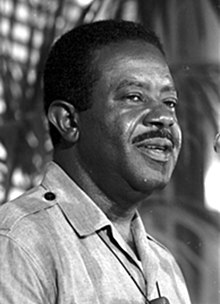
Back رالف أبرناثي Arabic رالف ابرناثى ARZ Ralph Abernathy Welsh Ralph Abernathy German Ralph Abernathy Spanish Ralph Abernathy Basque Ralph Abernathy Finnish Ralph Abernathy French Ralph David Abernathy Hungarian Ralph Abernathy ID
Ralph Abernathy | |
|---|---|
 Abernathy in 1968 | |
| 2nd President of the Southern Christian Leadership Conference | |
| In office 1968–1977 | |
| Preceded by | Martin Luther King Jr. |
| Succeeded by | Joseph Lowery |
| Personal details | |
| Born | David Abernathy March 11, 1926 Linden, Alabama, U.S. |
| Died | April 17, 1990 (aged 64) Atlanta, Georgia, U.S. |
| Political party | Democratic |
| Spouse | Juanita Jones Abernathy |
| Children | 5, including Ralph III and Donzaleigh |
| Occupation | Clergyman, activist |
| Known for |
|
| Military service | |
| Branch/service | United States Army |
| Rank | Platoon sergeant |
| Battles/wars | World War II |
Ralph David Abernathy Sr. (/ˈæbərnæθi/; March 11, 1926 – April 17, 1990) was an American civil rights activist and Baptist minister. He was ordained in the Baptist tradition in 1948. As a leader of the civil rights movement, he was a close friend and mentor of Martin Luther King Jr. He collaborated with King and E. D. Nixon to create the Montgomery Improvement Association, which led to the Montgomery bus boycott and co-created and was an executive board member of the Southern Christian Leadership Conference (SCLC). He became president of the SCLC following the assassination of King in 1968; he led the Poor People's Campaign in Washington, D.C.,[1] as well as other marches and demonstrations for disenfranchised Americans. He also served as an advisory committee member of the Congress on Racial Equality (CORE).
In 1971, Abernathy addressed the United Nations, speaking about world peace. He also assisted in brokering a deal between the FBI and American Indian Movement protestors during the Wounded Knee incident of 1973. He retired from his position as president of the SCLC in 1977 and became president emeritus. Later that year, he unsuccessfully ran for the U.S. House of Representatives for the 5th district of Georgia. He later founded the Foundation for Economic Enterprises Development, and he testified before the U.S. Congress in support of extending the Voting Rights Act in 1982.
In 1989, Abernathy wrote And the Walls Came Tumbling Down, a controversial autobiography about his and King's involvement in the civil rights movement. Abernathy eventually became less active in politics and returned to his work as a minister. He died of heart disease on April 17, 1990. His tombstone is engraved with the words "I tried."[2]
- ^ Lewis, Femi. "How Did Ralph Abernathy Work Alongside MLK During the Civil Rights Movement?". ThoughtCo. Retrieved April 15, 2021.
- ^ Cite error: The named reference
phillywas invoked but never defined (see the help page).